'Mechanical doping,' the biggest scandal to rock pro cycling since Lance Armstrong, is very real - here's what we know so far
What happened, and what have cycling officials said about it?

What has Van den Driessche said?

"It wasn't my bike — it was that of a friend and was identical to mine," a tearful Van den Driessche said, AFP reported.
According to Dutch news site Sport Wereld, a man named Nico Van Muylder, who claims to be a friend of Van den Driessche, said the bike is actually his. He hasn't said much else so far.
Van den Driessche has kept a low profile since appearing on TV.
What has the UCI said in the weeks since the scandal broke?
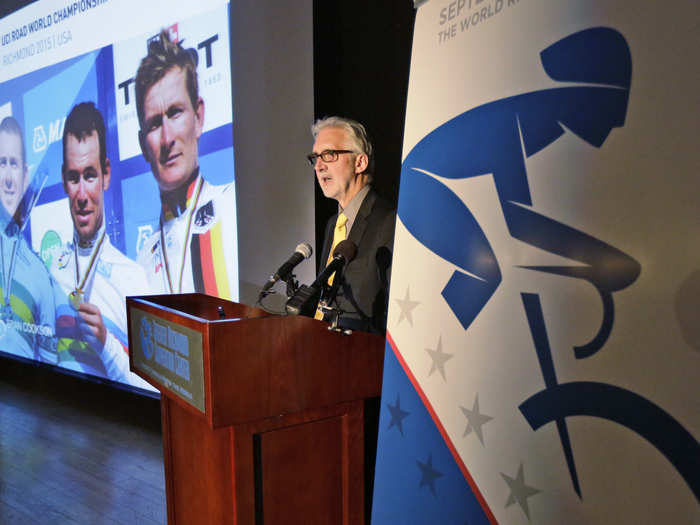
In the days that followed, the UCI said it had tested more than a hundred bikes at the world championships — and that it would be testing a lot more going forward:
The Union Cycliste Internationale (UCI) has taken the issue of technological fraud extremely seriously for many years. It has been clear for some time that the equipment exists to enable people determined to cheat to do so by installing devices hidden in bikes. That is why we’ve invested considerable time and financial resources in organising unannounced tests at races and have recently been trialing new methods of detection. We’ve also been using intelligence gathered from the industry and other information given to us. We tested over 100 bikes at the 2016 UCI Cyclo-cross World Championships in Heusden-Zolder and will continue to test large numbers of bikes at races throughout the season.
And sure enough, on Friday, February 12, the UCI announced it had tested another 90 bikes for motors, but this time at a road race in France.
Here's the full statement the UCI sent to Business Insider:
UCI statement on bike checks
The Union Cycliste Internationale (UCI) confirms that it has carried out unannounced bike checks at La Méditerranéenne on Friday 12 February, 2016, and that no technological fraud was detected.
Tests concerned 90 bikes from six teams participating.
These bike checks used the same type of equipment which the UCI trialed at the 2016 UCI Cyclo-cross World Championships in Heusden-Zolder (Belgium) where a concealed engine was detected. This equipment enables those performing the tests to investigate large numbers of bikes, both frames and wheels, in a short period of time.
The UCI has invested considerable time and financial resources in this area and trialling new methods of detection is part of its commitment to ensuring its tests are as robust as possible. Intelligence has also been gained from active engagement with the industry and other information given to us which has enabled us to refine and improve our testing.
The UCI will continue to test significant numbers of bikes in unannounced tests in all disciplines throughout 2016 and beyond.
This could become the biggest cycling scandal since Armstrong's great fall
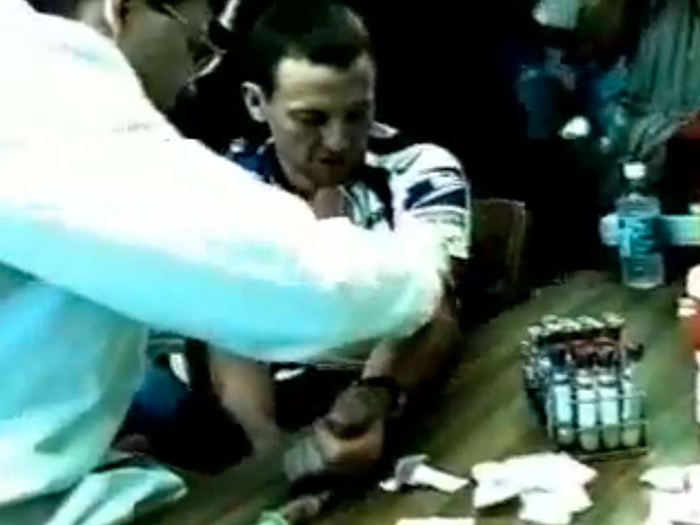
The news was a fresh blow to a sport still recovering from the Lance Armstrong doping scandal after the disgraced American cyclist admitted to cheating throughout his career in 2013 following years of denials and ruthless attacks on his accusers, AFP noted.
Related: Where are they now? The Lance Armstrong team that dominated the Tour de France
What, if anything, has the US Anti-Doping Agency said about 'mechanical doping'?
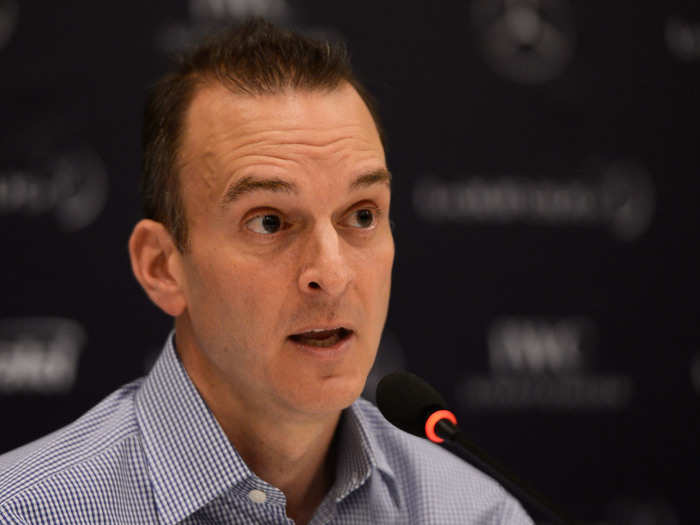
Business Insider recently spoke with a representative from USADA. The agency provided the following statement from its CEO, Travis Tygart, who helped take Armstrong down, regarding the incident in Belgium:
If true, it’s incredible the length that some will go to in order to win — the stop-at-nothing attitude erodes the very essence of why sport is valued and just like doping violates the rights of all those wanting to do it the right way.
Meanwhile, the greatest bicycle racer ever, Eddy Merckx, said anyone who commits a motorized doping offense should be barred from cycling for life. One of the sport's top team managers, Patrick LeFevre, said the same. A well-known coach said he was "disgusted."
How did the officials find out there was a motor in the bike?
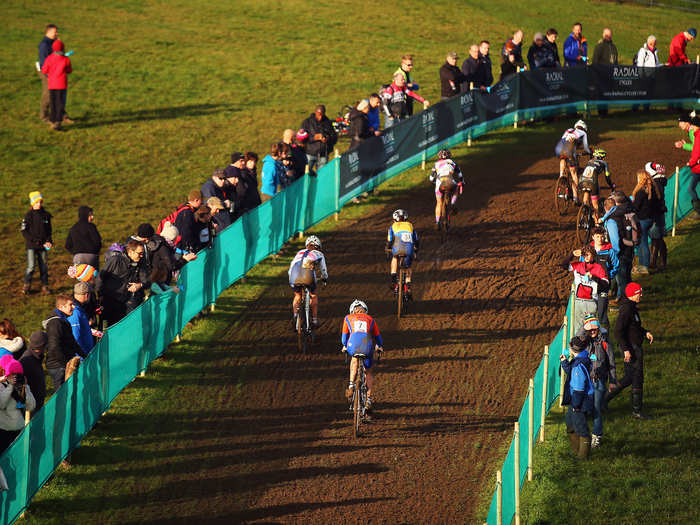
As said, the UCI has not revealed much about the actual motor used, who made it, how it works, or how it even detected a motor. It basically just said it had found a "concealed motor."
An Instagram video post, shared by a mechanic for a top US racer at the race weekend in question, shows a similar check being conducted with a tablet (click to play):
http://instagram.com/p/BBNvuByJ_xb/embed/
Width: 658px
On February 12, another video appeared on Instagram, apparently showing a UCI official testing a bike for a motor using a tablet device (click to play):
http://instagram.com/p/BBsNethuWCZ/embed/
Width: 658px
What might a hidden bicycle motor even look like?
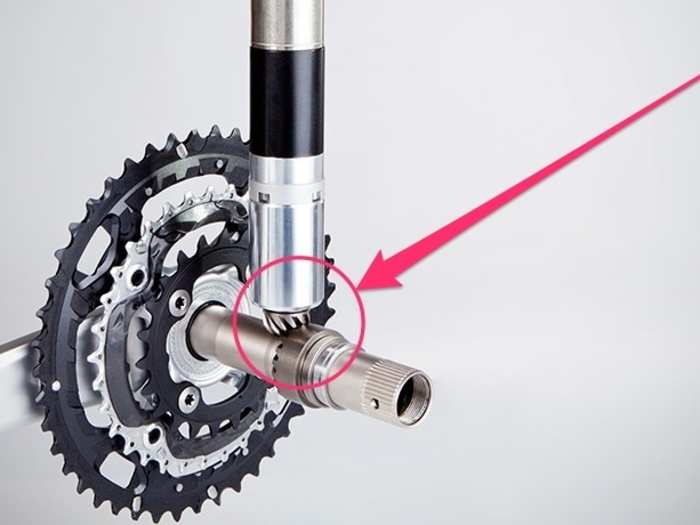
There's an Austrian company that makes one: It's called the Vivax Assist.
The motor goes into a bike frame, down the seat tube and into the bottom bracket, and then, through a gear system, it powers the cranks. If you stop pedaling the cranks still turn. You use a button, installed on the handlebar, to turn the motor on and off.
Business Insider spoke with a representative of Vivax, Ulrike Treichl. She said she was shocked upon hearing the news that a competitive cyclist had been caught with a hidden motor in her bike, but made it clear that Vivax has no idea whether or not the motor used was one of its own.
"We can't say if she used our motor, but of course maybe she used it," Treichl said. "We don't know. For us it is very disappointing when a product that can bring great benefit to many customers is used for other intents, for that is really unacceptable.
"The system is not intended for use in competition," she added. "This was not in the mind of the inventor. And we'd like to say we condemn the use of the Vivax Assist system in competition."
Treichl said Vivax sells 1,200 motors a year and is the only company in Europe that makes such a product. Vivax does not deliver to private persons but works strictly through distributors.
No one connected to the cyclist had purchased products from Vivax, Treichl added.
How much does a 'hidden' motor cost?

The Vivax Assist, for example, costs $3,000. It weighs about 4 pounds and can produce up to 110 watts of power. That's a lot of power, and can be the difference between finishing first and finishing last.
What happens if you get busted for mechanical doping?
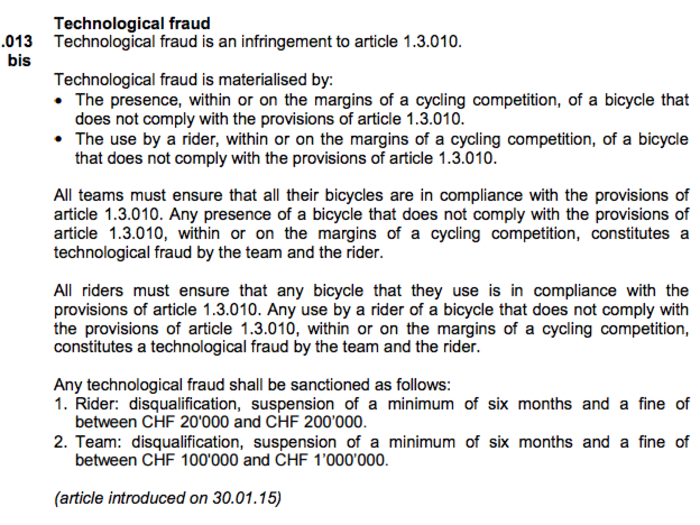
As stated in its rules and regulations and excerpted above, the UCI takes technological fraud seriously. Penalties include disqualification, a minimum six-month suspension, and a fine of up to 200,000 Swiss francs (about $195,000).
Teams could be fined 1 million francs ($977,500).
How does the scandal make the sport and the UCI look?
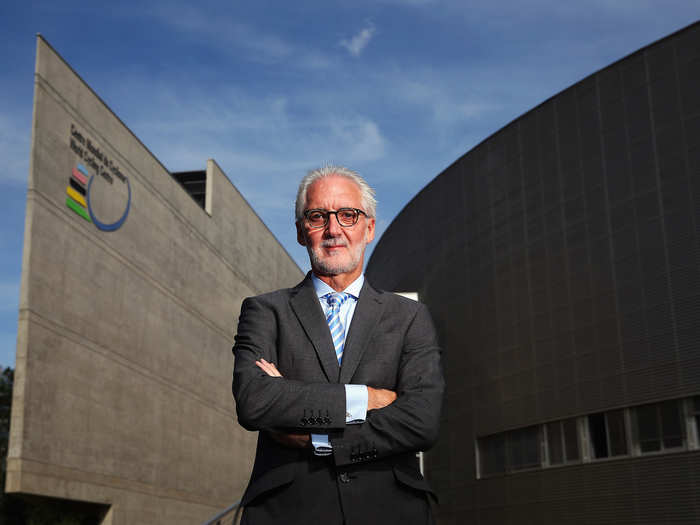
While this scandal is a blow to cycling, all in all the testing and the bust make the governing body look pretty good. There had been a lot of speculation over the past few years about whether so-called mechanical doping even existed or was happening at cycling's top level.
At first the UCI took some ribbing from fans and riders, who joked about such fraud, as if it was a conspiracy theory. But the UCI kept testing and testing, and now it has shown it exists.
But clearly the governing body has a lot of work to do going forward.
How pervasive is mechanical doping?
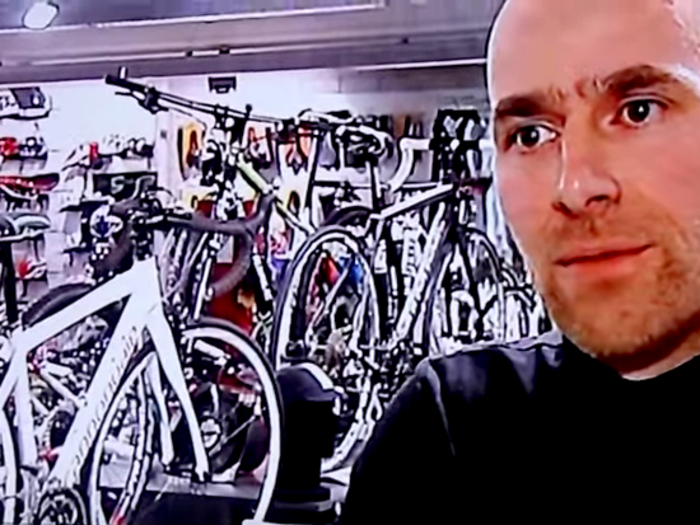
Tough to say. But Business Insider did speak with a Belgian distributor of the Vivax Assist motor, Bart Daems. He said he's sure there are at least some amateur racers using a motor in their bikes.
"I think in the amateur circuit, for sure there will be some guys that will use [a motor], because there are no UCI," he said.
Meanwhile, the cyclist's father and brother face charges of stealing birds
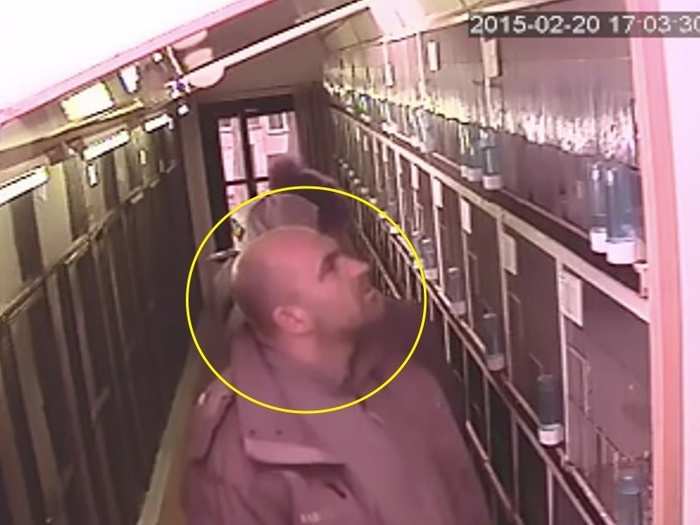
If Femke Van den Driessche wasn't already dealing with a lot, Belgian website HLB.be reported that her father, Peter, and brother, Niels, and their friend are facing charges of stealing two exotic parakeets from a pet store in 2015. The store's manager, who turned them in, said it was only after reading about the cycling scandal, and seeing the cyclist's father in the news, that she recognized him from the store's video footage.
If found guilty, they could go to prison and be given fines of several thousand euros. What's more, Niels, a cyclist, is already serving his own doping suspension, Sport Wereld reported.
Will the scandal in any way affect races like the Tour de France?
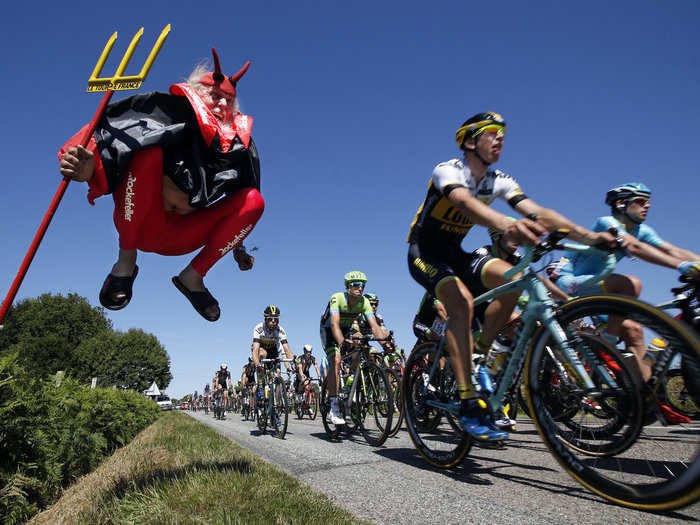
Maybe. The owner of the Tour, the Amaury Sport Organisation, said on February 12 that the UCI "must sort out controls for motorized cheating before any negotiations to rejoin the UCI WorldTour can take place," VeloNews reported.
There's a complex backstory to the ASO and the Tour rejoining the UCI WorldTour, which Business Insider reported on in-depth last month. It boils down to power, money, and control of pro cycling. It will be interesting to see how this recent scandal plays into the ASO's favor, if at all, as it seeks to solidify its position in the sport.
Related: Inside the war over the Tour de France, and how it may change pro cycling forever
What happens next?
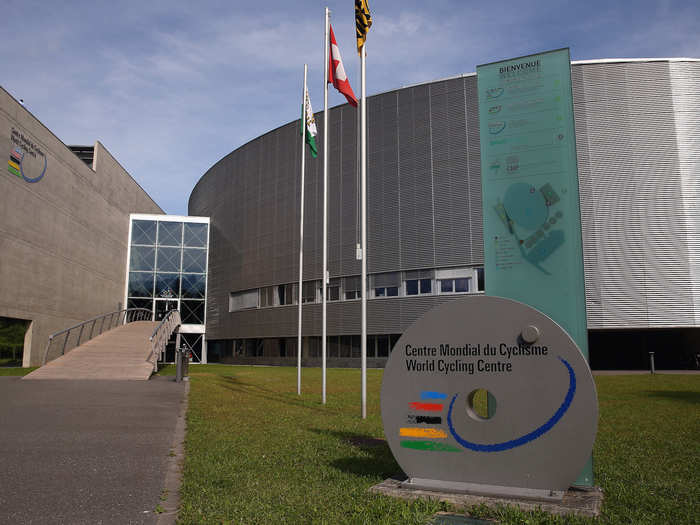
On February 10, the UCI said it had sent Van den Driessche's case to its Disciplinary Commission, which will hear "all relevant parties in the weeks to come."
"Working independently from the UCI, the Disciplinary Commission is the body in charge of imposing sanctions for breaches of the UCI Regulations," it added. "No other statement will be made until a decision has been rendered."
Stay tuned.
'Mechanical doping,' the biggest scandal to rock pro cycling since Lance Armstrong, is very real - here's what we know so far
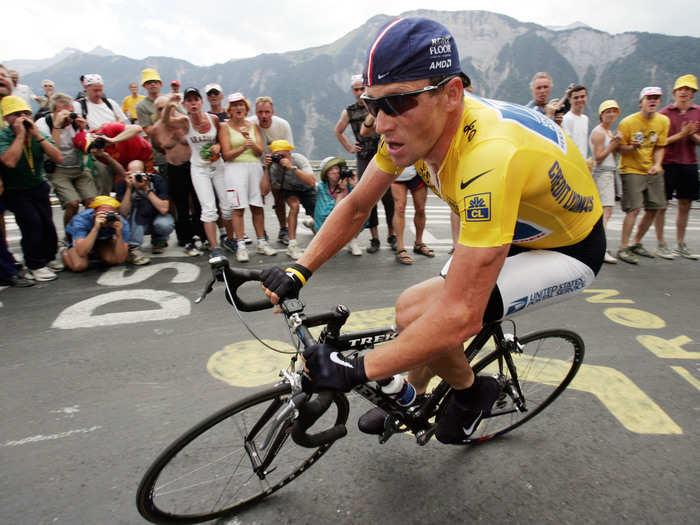
Popular Right Now
Advertisement